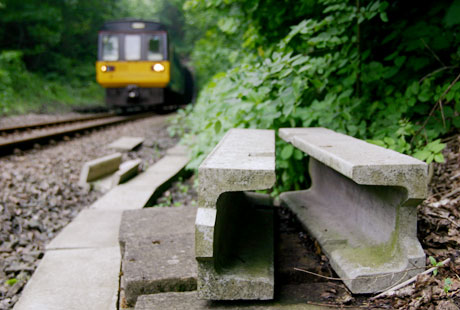|
Good to see RSSB’s Aidan Nelson extolling the virtues of good access in his opinion piece on the TSSG website - as he says, it’s "every bit as important as delivering the work itself safely". Shame it rarely gets as much attention. He’s also right in saying that we all - in theory - have a duty to say ‘no’ when access arrangements are unsafe. Trackworkers though are pragmatists and tend to make the best of it in order to fulfil their other duties.
We could have a long, philosophical debate about the meaning of ‘unsafe’ - indeed some people have made a career out of it. If you return to the access gate with both legs intact must it, by definition, have been a safe cess? Answers on a postcard.
I’ve been confronted by a few minor access challenges of my own this week and digitally captured them for posterity and review. Sad I know.
This (below left) is the down cess of the East Coast Main Line just south of Ardsley tunnel near Leeds. It’s a tricky little spot - from the access gate, reverse curves restrict sighting to around 300 yards each way. Noise from a nearby motorway masks the sound of approaching trains. But, having played Russian Roulette to cross the railway, here (below right) is the position of safety - 4 feet from the nearest line and 2 feet below it!
 |
 |
| The Down cess at Ardsley Tunnel |
Catchpit with missing lid |
On to Woolley tunnel between Barnsley and Wakefield. I didn’t need my key for the access gate - conveniently it was open, just as it was when I last visited.
 |
| Access gate near Crigglestone |
The troughing route has recently been refurbished and a few homeless leftovers have taken up residence by the mouth of the Down tunnel, waiting invitingly for the next passing hooligan to place on the line or for the local p-way to fall over.
 |
| Homeless leftovers from a recent troughing project |
OK, so I’m still alive to tell the tale. And there hasn’t been a devastating derailment at Woolley’s northern portal. Trouble is - it only has to happen once.
Just how big a logistical nightmare is it to remove a dozen, redundant troughs? Can it really be prohibitively expensive to replace the catchpit lids?
Trackworkers are institutionally conditioned to tolerate these hazards. If they didn’t, they’d never work. But why should they have to? Why should the onus be on them to say ‘no’? If the industry wants people out there on the railway, doesn’t it have a duty too?
So what’s the solution - piecemeal attacks on lineside vegetation? Revisit the scrap clearance programme? Another disjointed non-strategy?
Positive safety culture cascades downwards. It’s time for those at the highest level to recognise that the status quo is unacceptable and commit to tackling it. If the corridor to their office featured an open trap door, action would soon be taken to close it. But their practical detachment acts as a barrier when it comes to the trackworkers’ domain. Although their words are often admirable, in truth there’s no real engagement. It would require a vast sum of money - politically unpalatable in the current climate - and, at the end of it, who’s going to attend the press launch? There’s no media clamour for a safe cess. They’d tell you there are just too many other demands on the railway’s time, resources, budget and focus.
|
| Although their words are often admirable, in truth there's no real engagement. |
|
So is this a valid argument or an output from the Useful Excuses Department? An eyecatching term is currently doing the rounds - value of preventing a fatality (VPF). RSSB is in the throws of researching its ‘suitability in safety decision making’ - they’ve clearly underspent their budget again. It sounds as morally corrupt as the old Railway Group target of killing just one in 10,000 trackworkers annually. Each one of those deaths cost the industry around £1million. But, applying VPF, the sums for safe cess won’t add up until vanloads of trackworkers are wiped out as a result of its absense.
Even if that happened and walkways miraculously appeared across the network, it would be a reactive consequence of a tragedy - hardly commendable. Wouldn’t it be better, just for the sheer hell of it, to be proactive on this occasion? Do we really want to wait until someone falls down that open catchpit and gets annihilated by the 1410 out of Westgate? Or should the industry get off its corporate backside and fulfil its obligations, however problematic and inconvenient they might be?
Yes, we know it’s a mammoth undertaking and wouldn’t happen overnight. But that doesn’t justify the failure to make a real, determined start.
Story added 1st July 2005
|